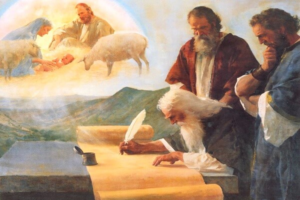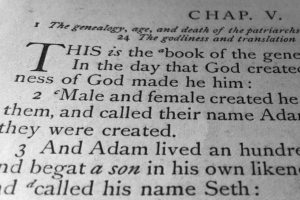Writing
THEOLOGY, SCIENCE & APOLOGETICS
Select a category from the drop down menu, or browse the latest articles below.

Who Wrote the Pastoral Epistles? The Case for Traditional Authorship
Among the epistles traditionally attributed to the apostle Paul, none has been subjected to as much controversy concerning their authorship as the Pastoral epistles. There is a near-consensus among critical scholars that the Pastoral letters are pseudepigraphal.

Is the Bible Without Error? Inspiration, Inerrancy, and Christian Epistemology
A common litmus test for Christian orthodoxy is adherence to the doctrine of Biblical inerrancy, which maintains that the Biblical text, in the original autographs, is completely without error in all that it affirms.

A Commentary on Romans — Longing to Go to Rome (1:8-15)
Paul’s intended trip to Rome, a journey that he purposed to eventually take him to Spain (Rom 15:22-29), had two basic objectives. The first was to enjoy fellowship with the believers in Rome (Rom 1:11-12), and the second was to preach the gospel to those who were in Rome (Rom 1:13, 15).

A Matter of Days: Interpreting the First Chapter of Genesis
In this article, I will explore the text of the first chapter of Scripture, Genesis 1, with a view towards determining whether this text commits one to a young earth interpretation of origins, or at least the extent to which the text tends to support such a view, if at all.

A Commentary on Romans — The Prologue (1:1-7)
Paul had, at the time of his writing, never visited the Roman church in person (Rom 1:13; 15:22-29). He thus expands his salutation so as to include a creedal summary of the gospel and his apostolic calling. Presumably Paul’s intent here was to establish credibility with the recipients of his letter, whom he had not yet met with in person.

Did People Once Live For Hundreds of Years? Evaluating the Long Life-Spans of Genesis 5 & 11
I do not believe this evidence to be decisive in favor of a non-literalist interpretation of those ages, but it does call for caution against dogmatism in reading the ages given in the Biblical genealogies literally.

The Search for Adam and Eve: Human Origins According to Scripture and Science
The historicity of Adam and Eve is a question which strikes at the heart of the Christian faith. If the primordial pair did not exist, then the historical and biblical doctrine of the fall becomes extremely difficult to maintain.

Did Death Exist Before Man Sinned? Appraising a Creationist Argument
Some may wonder why I have chosen to address this topic prior to engaging with other topics (such as the meaning of the ‘days’ in Genesis 1). I have done so because many young earth creationists consider this to be the more pressing concern, and perhaps even the strongest argument for their position from Scripture.

The Propriety of Allowing Science to Illuminate Scripture
The “young earth” teaching introduces an unnecessary and erroneous tension between Scripture and science that has confused many and I have personally met many people who have turned aside from their faith due to what they see as the impossible challenge of trying to reconcile that understanding of Scripture with the clear scientific evidence. They end up being neither ‘old’ or ‘young’ earth and worst of all not believing that God is the Creator at all.